Social behavioral health is a field of study that looks at the ways in which social and behavioral factors influence health and well-being. It includes research on topics such as health disparities, health promotion, and disease prevention.
Most people think of physical health when they think of health. However, there is more to health than just physical health. There is also social and behavioral health.
Social health is about how well you interact with others. It’s about having relationships and being able to communicate and connect with others.
Behavioral health is about how you cope with stress and make healthy choices. It’s about managing your emotions and behaviors in a healthy way.
Both social and behavioral health are important for overall health. Here’s why:
1. Social health helps you live longer.
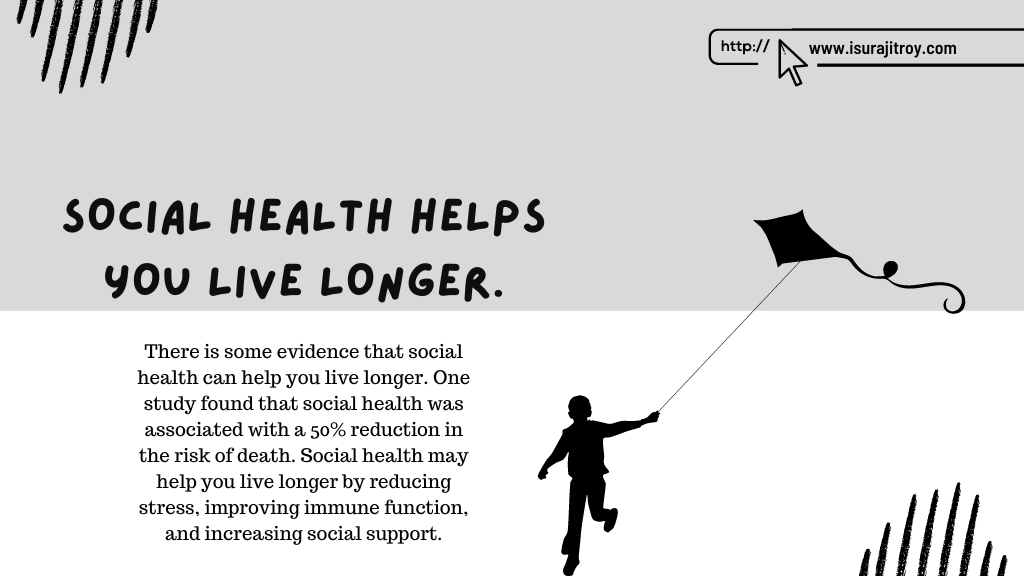
It’s no secret that leading a healthy lifestyle can help you live longer. But did you know that social health is also an important factor in longevity? Studies have shown that social health is linked to a longer life. One study found that people who had strong social connections were 50% more likely to live longer than those who didn’t.
That’s right, maintaining strong social ties and staying connected with loved ones can help you live a longer, healthier life. In fact, research has shown that social health is just as important as physical health when it comes to longevity.
So why is social health so important? Well, studies have shown that social isolation and loneliness can lead to a host of health problems, including high blood pressure, heart disease, and depression. On the other hand, maintaining strong social ties can help reduce stress, improve mental health, and even boost your immune system.
So if you want to live a long and healthy life, make sure to focus on your social health as well as your physical health. Stay connected with loved ones, join a social club, or volunteer in your community. It’s good for your mind, body, and soul!
2. Social health helps you stay physically healthy.
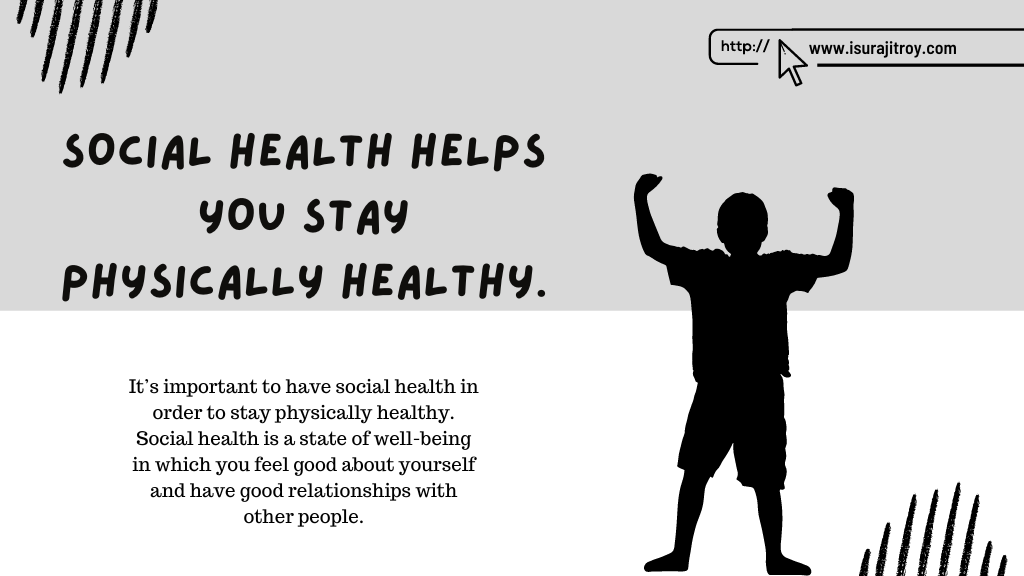
When you have strong social connections, you’re more likely to take care of your physical health. For example, you’re more likely to eat healthy, exercise, and get regular check-ups. Your social health is just as important as your physical health. Just like you need to exercise and eat right to stay physically healthy, you need to nurture your social health to stay mentally and emotionally healthy.
Your social health is a measure of your well-being. It’s determined by the quality of your relationships, how connected you feel to others, and how much social support you have. All of these factors play a role in your mental and emotional health.
There are a number of things you can do to nurture your social health. First, make an effort to connect with others. Spend time with family and friends, join a club or group, or volunteer. Secondly, nurture your relationships. Show your loved ones how much you care, and work on resolving any conflict you may have. Lastly, make sure you have a strong social support system. This could be family, friends, or even a professional support system.
If you nurture your social health, you’ll be on your way to a happier, healthier life.
3. Social health helps you cope with stress.
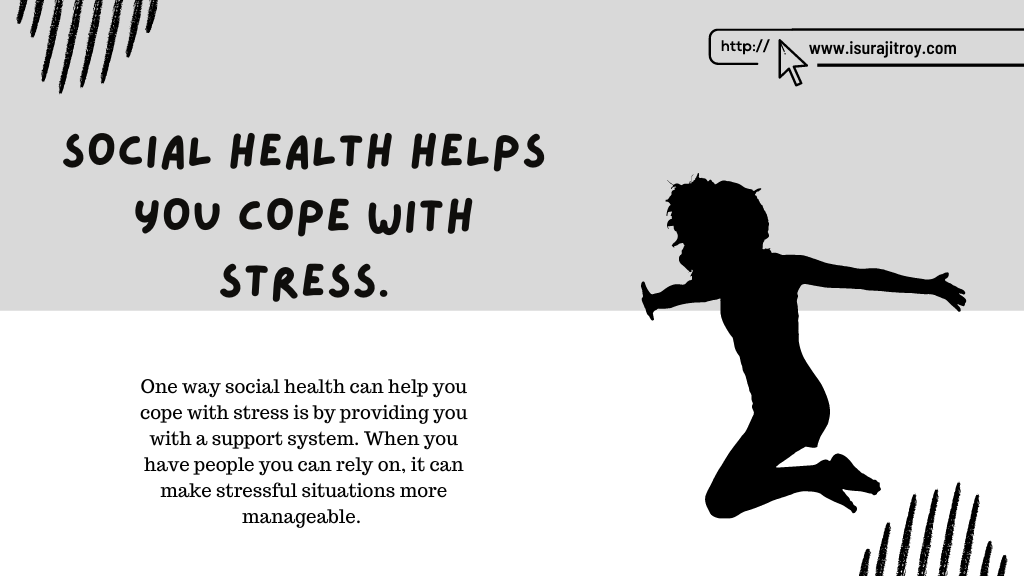
Stress can have a negative impact on your health. But, if you have strong social connections, you’re more likely to cope with stress in a healthy way.
We all know that social health is important for our overall wellbeing, but did you know that it can also help you cope with stress? When you have a strong social network, you have people to lean on during tough times. They can offer support and understanding, which can make a big difference in how you’re feeling. Additionally, socializing can help take your mind off of your stressors, giving you a much-needed break. So next time you’re feeling overwhelmed, don’t forget to reach out to your friends and loved ones.
4. Social health helps you avoid risky behaviors.
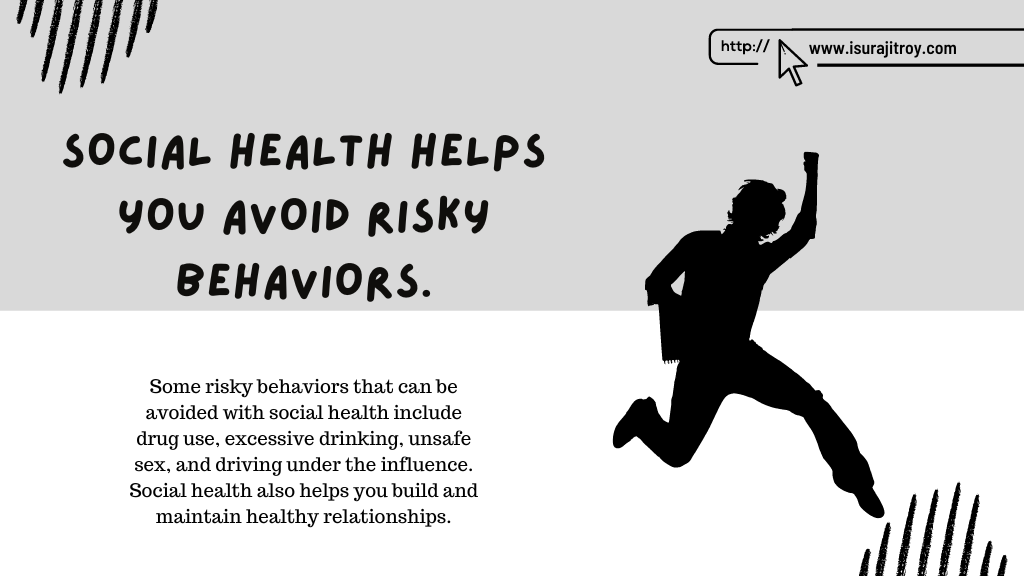
There’s no denying that social health is important to overall health and wellness. According to the Centers for Disease Control and Prevention (CDC), social health can help you avoid risky behaviors, like smoking, drinking, and using drugs. Additionally, social health can help improve your mental health and overall satisfaction with life.
The CDC recommends that adults get at least 2 hours and 30 minutes of moderate-intensity aerobic activity (like brisk walking) every week. However, getting social health benefits doesn’t have to mean going to the gym. There are plenty of ways to get active with friends, family, and your community. Here are a few ideas:
- Take a group fitness class.
- Go for a walk or run with a friend.
- Play a sport with a group.
- Get involved with a community garden.
- Join a dance or yoga studio.
- Volunteer with a local organization.
In addition to physical activity, social health also involves having strong relationships. These relationships can be with family, friends, co-workers, or anyone else you interact with on a regular basis.
5. Social and behavioral health are linked.
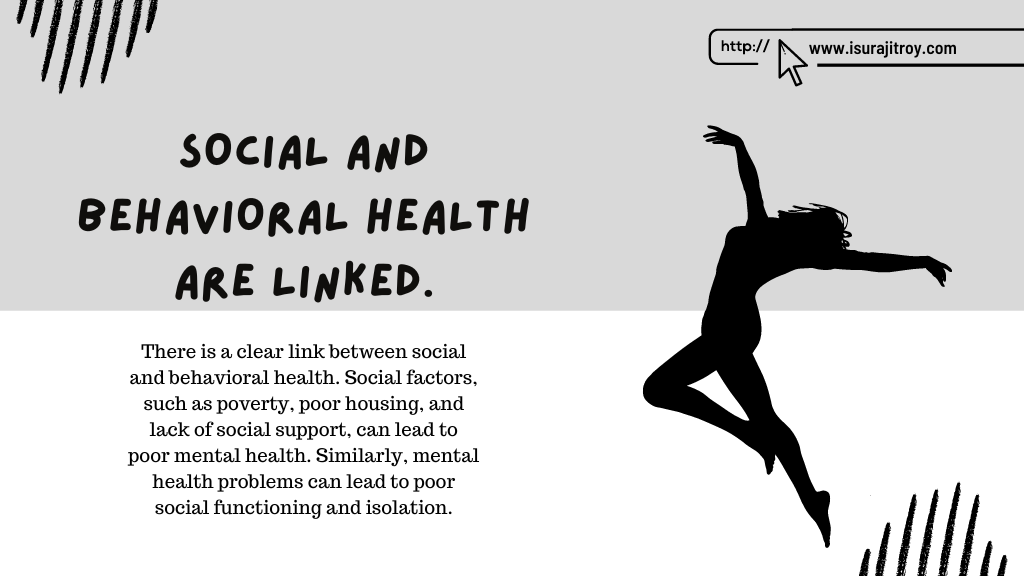
Social and behavioral health are linked. That means that if you have strong social connections, you’re more likely to have healthy coping skills. And, if you have healthy coping skills, you’re more likely to have strong social connections.
There is a growing body of evidence that suggests social and behavioral health are linked. For example, studies have shown that social isolation can lead to poor mental health, and that people who have strong social support networks are more resilient to stress.
There are a number of mechanisms by which social and behavioral health are linked. One is that social interaction can influence the release of stress hormones. When we interact with others, our bodies release oxytocin, which is a hormone that can help to reduce stress. Another mechanism is that social interaction can help to regulate our emotions. When we share our feelings with others, we are more likely to feel supported and less likely to feel overwhelmed by our emotions.
It is clear that social and behavioral health are linked. The next question is how we can use this knowledge to improve our health. One way is to make sure that we have strong social support networks. This can be done by staying connected with friends and family, participating in community activities, and reaching out to others when we need help. Another way is to be mindful of our stress levels and to take steps to reduce stress when possible. This may include exercise, relaxation techniques, and spending time in nature. By understanding the link between social and behavioral health, we can take steps to improve our overall health and wellbeing.
6. Everyone can benefit from social and behavioral health.
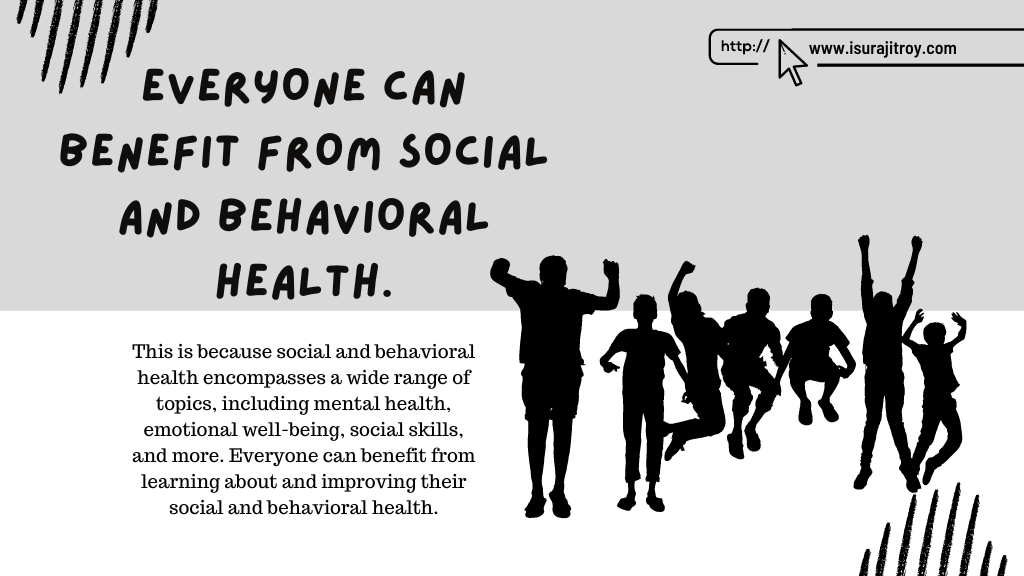
Everyone can benefit from social and behavioral health. Whether you’re struggling with your mental health, physical health, or both, social and behavioral health can help.
At its core, social and behavioral health is about helping people feel good about themselves and interact effectively with others. And while that might sound like something that only benefits those with mental health conditions, the reality is that we all can benefit from social and behavioral health.
Think about it – the ability to effectively communicate with others, manage our emotions, and form positive relationships are all skills that we use every day. When we feel good about ourselves and our ability to interact with others, we’re more likely to be successful in all areas of our lives.
So how can you improve your social and behavioral health? Here are a few ideas:
- Make time for social activities that you enjoy. Whether it’s going out with friends, attending a meetup group, or volunteering, social interaction is key to feeling good about yourself.
- Be mindful of your thoughts and emotions. Acknowledge your feelings, but don’t dwell on them. Practice positive self-talk and focus on the good in your life.
- Seek professional help if you’re struggling. A therapist can help you learn healthy coping mechanisms and work through any underlying issues.
Everyone can benefit from social and behavioral health. By making time for social activities, being mindful of your thoughts and emotions, and seeking professional help when needed, you can improve your overall wellbeing.
Improve your social and behavioral health.
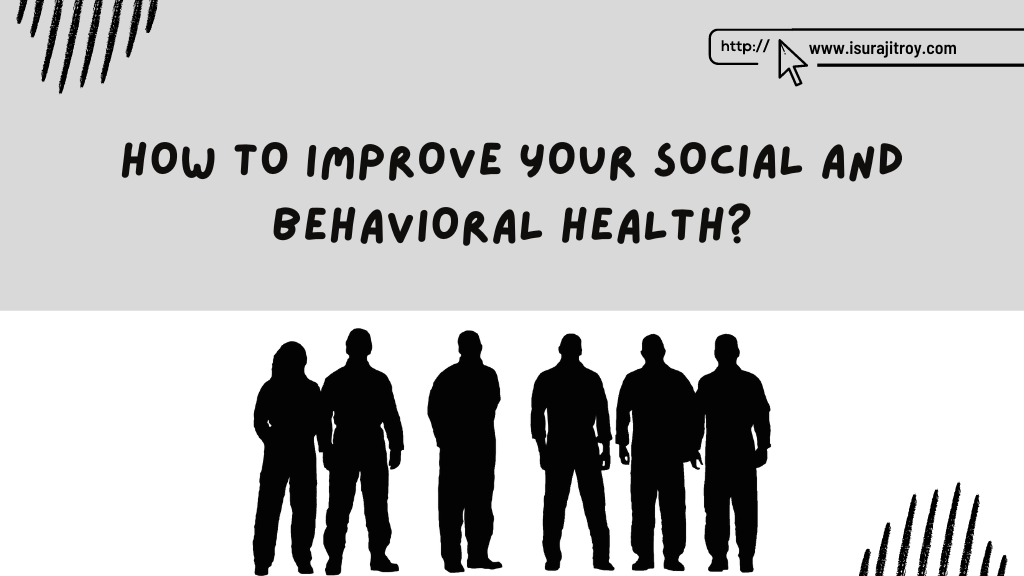
If you’re interested in improving your social and behavioral health, there are a few things you can do:
1. Connect with others.
Make an effort to connect with others. Spend time with friends and family. Join a club or group. Volunteer. Go to social events.
2. Talk to someone.
If you’re struggling, talk to someone you trust. This could be a friend, family member, therapist, or counselor.
3. Seek help.
If you’re struggling with your mental health, seek professional help. This could include seeing a therapist or counselor, taking medication, or participating in a support group.
4. Be mindful of your choices.
Be mindful of your choices and make sure they align with your goals. If you’re trying to improve your health, make choices that will help you reach your goals.
5. Be patient.
Change takes time. Be patient with yourself and don’t expect overnight results.
Conclusion
Social and behavioral health are important for overall health. If you’re interested in improving your social and behavioral health, there are a few things you can do, such as connecting with others, talking to someone, and being mindful of your choices.






I really liked your site.